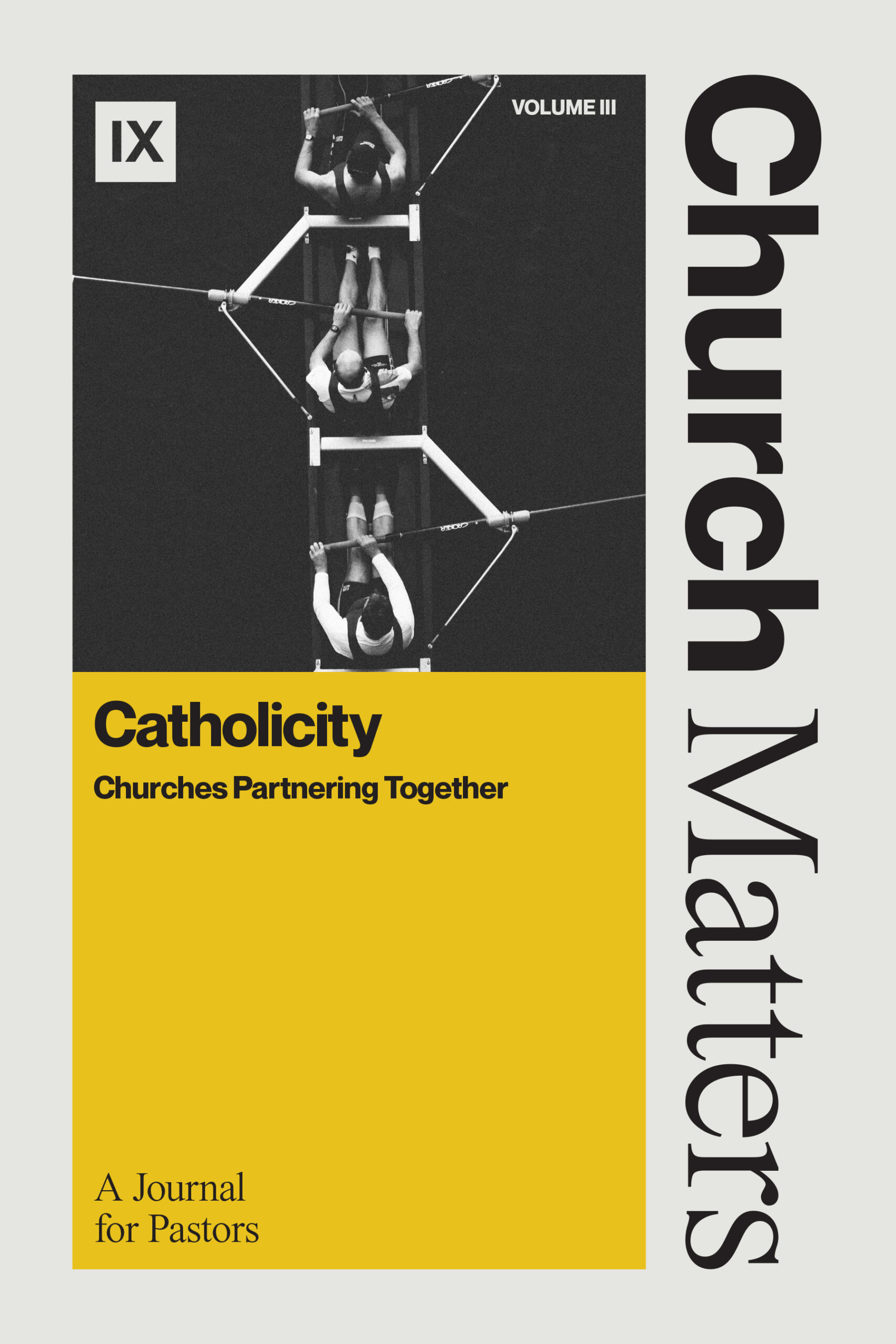Stop Calling Them Names
Many of the biggest “Aha!” moments in my life involve John Piper. One of the most important came in June of 2008. Barely 21 years old, I had just moved to seminary, and I was pretty adept at looking down my nose at churches that didn’t practice Christ-centered preaching as I defined it. I was quick to disparage anyone to my theological right as a “fundamentalist” or “legalist.”
Then I read John Piper’s “20 Reasons I Don’t Take Potshots at Fundamentalists,” in which he lists specific reasons for why he’s grateful for a tribe not his own. Here was one of my heroes joyfully pointing out evidences of grace in actual Fundamentalists.
Now, years later, I recognize that this type of warm, large-hearted thankfulness for fellow Christians of a different stripe is a dominant characteristic of the godliest people I know.
Of course, the Bible teaches us to directly confront theological error. It even has a category for using harsh speech with wolves who pervert a church’s fidelity or lead people into eternal destruction (cf. Acts 13:8–11). But neither should Christians engage in the worldly practice of name-calling or employing theological slurs, especially when speaking of brothers and sisters in Christ. The trouble is our social-media-dominated outrage culture rewards quick indignation and careless accusations. And, I fear, this habit of name-calling and slander too easily slips into the church and characterizes our conversations.
- You don’t hold my exact position on ecclesiology? Pragmatist!
- You don’t advocate for my political theology? Liberal!
- You don’t address public issues to the degree I think you should? Pietist!
- You express concern over the worldly influence of my favorite TV show? Legalist!
An old joke we bandied about when I was in seminary said: “What’s the definition of a liberal? Anyone to my left. What’s the definition of a fundamentalist? Anyone to my right.” For many Christians that joke is now their operating system for theological disagreement. The joke has become reality—and it’s not funny.
If you’re prone to use name-calling with theological opponents, consider three passages in Scripture and how they address our unhealthy culture in evangelicalism of pejorative labeling.
1. Beware the Eternal Implications of Name-Calling (Matthew 5:21–22)
Jesus warns his followers about the serious sin of pejorative name-calling.
You have heard that it was said to those of old, ‘You shall not murder; and whoever murders will be liable to judgment.’ But I say to you that everyone who is angry with his brother will be liable to judgment; whoever insults his brother will be liable to the council; and whoever says, ‘You fool!’ will be liable to the hell of fire. (Matt. 5:21–22)
Jesus doesn’t treat “insults” or name-calling (“You Fool!”) as respectable sins but instead exposes those sins in light of the eternal judgment that awaits them. Jesus made similar statements throughout the gospels. He later warned that on the final day “people will give account for every careless word they speak” (Matt. 12:36).
As the context of this passage makes clear, we’re most prone to insults and name-calling when we’re angry or feel threatened (like we often feel in theological debates with other Christians!). We all know from experience how easy it is to rationalize harsh language, insults, and pejorative speech when we’re bristling. But as Samuel James points out in his forthcoming book Digital Liturgies, “Righteous people can become angry. Angry people have a very hard time being righteous.”
Pejorative name-calling, even in the form of derisively applying theological labels (Legalist! Liberal! Woke! Fundamentalist! You Fool!), should have no place among God’s people—and we’ll give an account for it on the final day.
2. Separate, Don’t Snipe (Acts 15:36–41)
If you’ve ever had serious disagreements in your elder board or with a mission team, don’t be discouraged. The Apostle Paul knows just how you feel.
And after some days, Paul said to Barnabas, “Let us return and visit the brothers in every city where we proclaimed the word of the Lord and see how they are.” Now Barnabas wanted to take with them John called Mark. But Paul thought best not to take with them one who had withdrawn from them in Pamphylia and had not gone with them to the work. And there arose a sharp disagreement, so that they separated from each other. Barnabas took Mark with him and sailed away to Cyprus, but Paul chose Silas and departed, having been commended by the brothers to the grace of the Lord. And he went through Syria and Cilicia, strengthening the churches. (Acts 15:36–41)
It’s easy to imagine what this “sharp disagreement” might have sounded like.
Paul: We’re not taking Mark! He’s not cut out for this; he proved that in Pamphylia!
Barnabas: Come on Paul! We believe in a God of grace! Give Mark another chance. God doesn’t accept us on the basis of our performance, we should treat Mark the same way.
Paul: Barnabas, qualifications matter! He’s not qualified for the work.
Barnabas: You’re being too harsh!
Paul: You’re being soft on him because he’s your cousin (Col. 4:10).
Barnabas: Legalist!
Paul: Liberal!
Now I’m sure Paul and Barnabas were godlier than I have portrayed them, but you get my point. The Barnabas-Paul disagreement wasn’t a matter of personality differences. I’m sure each understood their position to be deeply rooted in theological principle—so much so that they could not in good conscience continue ministering alongside the other person. Like many conflicts among God’s people the presenting issue (whether to take John Mark) was probably a proxy war for deeper theological disagreements (see also Numbers 12:1–2).
Intriguingly, Scripture never renders a judgment on which of them was right. Moreover, neither Paul nor Barnabas spend the rest of their ministries sniping at one another from the sidelines. Paul never warns churches in his letters, “Watch out for Barnabas and Mark and people in their tribe. They’re a bunch of nepotistic softies!” Quite the opposite, Paul only speaks positively of Mark in his future epistles (Col. 4:10; Phlm. 24; 2 Tim. 4:11).
Again, I’m not suggesting Christians can’t have public, intramural debate. But in our hyper-connected age, we’d do well to notice the apostolic example. Peaceable separation can be good for the kingdom. Focus on the field the Lord has given you to plow and the sheep you’ve been given charge over. Don’t spend your ministry sniping from the sidelines at other ministries.
3. Cultivate Awareness of Your Own Sin (Titus 3:1–3)
If you struggle with rushed judgments, name-calling, or pejorative labeling it might be because you have a high view of yourself and a low view of your sin. Surprising? Consider Paul’s words on how pastors should instruct their congregations in Titus 3:2. Here Paul’s words reflect Jesus’s instructions in Matthew 5. Rather than shouting “you fool!” Christians should “speak evil of no one, avoid quarreling, be gentle, and show perfect courtesy toward all people [even to people who might genuinely be foolish!]” (Titus 3:2).
Interestingly, Paul justifies this command by reminding his readers of their past sin. “For,” he says in the next verse, “we ourselves were once foolish, disobedient, led astray, slaves to various passions and pleasures, passing our days in malice and envy, hated by others and hating one another” (Titus 3:3).
In other words, if you want to cultivate gentle, courteous speech, consider where you once were, and where you are now by the grace of God. Harsh speech, name-calling, and pejorative labeling reveal a heart deeply unaware of its own corruption.
THE HEART OF THE MATTER
Insults, name-calling, and pejorative labeling may be commonplace in our culture of perpetual outrage. After all, “out of the [unregenerate] heart come evil thoughts . . . false witness, [and] slander” (Matt. 15:19). But these patterns of evil speech should be foreign to the life of the church. Our words about our brothers and sisters in Christ should be careful and courteous, truthful and tender, reflecting the new life we’ve received in the Spirit. If we carelessly call people names, then we’d do well to take a long look at the state of our hearts. It’s serious business because on the final day we will give an “account for every careless word” (Matt. 12:36).









